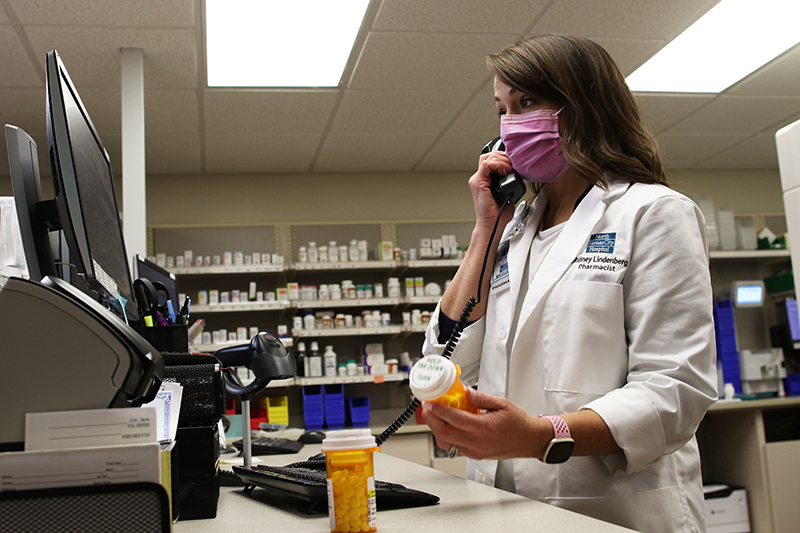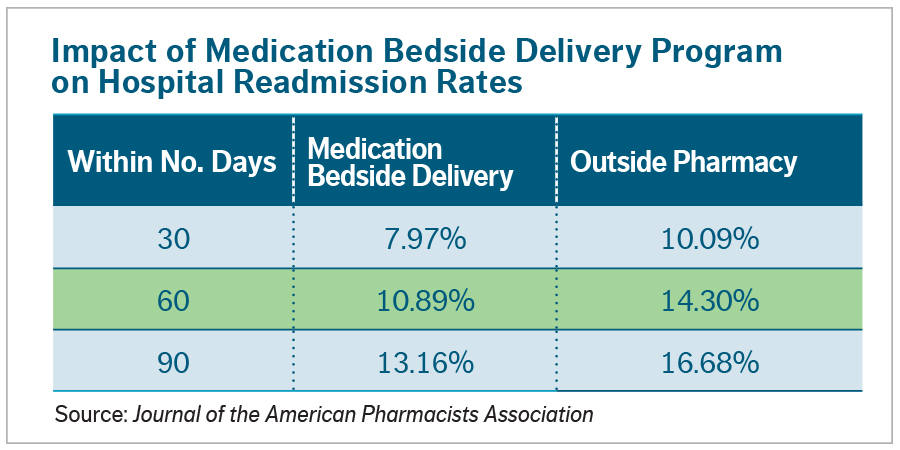 Whitney Lindenberg, PharmD, is one of the NKCH outpatient pharmacists who consult with inpatients about their discharge prescriptions.
Whitney Lindenberg, PharmD, is one of the NKCH outpatient pharmacists who consult with inpatients about their discharge prescriptions.
North Kansas City Hospital has launched a program that brings prescriptions directly to patients prior to discharge. Called meds to beds, the goals are to provide medication education, improve patient compliance and satisfaction, expedite discharges and reduce hospital readmissions.
The NKCH Pharmacy began offering the service earlier this year for two inpatient areas – Rehabilitation and the Total Weight Loss Center. In the coming months, Cardiology, Maternity, Orthopedics, Surgery and other departments will be added.
“We know many people don’t fill their prescriptions when they leave the hospital,” said David Hitchcock, RPh, MBA, Pharmacy supervisor. “This program ensures they leave our hospital with 30 days of medication.”
Pharmacy is quick to fill prescriptions, too.
“We want to quickly place medications in patients’ hands so as not to cause any discharge delays,” said Hitchcock, adding that previously purchased Pharmacy technology accommodates the additional output of prescriptions.
Reduced Readmissions
Hitchcock noted that several studies point to readmission reductions when medication bedside delivery is provided.
In “Impact of Medication Bedside Delivery Program on Hospital Readmission Rates,” researchers found a bedside delivery group to be significantly lower in readmissions than those of an outside pharmacy group at 60 and 90 days, although they were not at 30 days. (See table.) The single-center retrospective cohort study looked at patients who were low-to-moderate transitions of care risk with unplanned admissions to a large academic medical center between Jan. 1, 2017, and Jan. 1, 2019. Researchers evaluated 6,583 patients discharged with a total of 3,905 patients. The article was published in the Jan. 1, 2021, Journal of the American Pharmacists Association.

Pharmacy Outreach
Prior to discharge, a Pharmacy tech discusses the program with the patient and determines if NKCH accepts their insurance. When the discharge order comes through the patient’s electronic medical record, medications are pulled and a Pharmacy tech makes the delivery to the patient. The tech can provide the patient with general information.
More intricate questions from patients are referred to a pharmacist for telephone or video consultation.
“Patients may have questions about interactions with over-the-counter medications, the proper technique for an injectable medication or an inhaler, or whether a medication can be taken with or without food,” added Whitney Lindenberg, PharmD, Outpatient Pharmacist.
Prescriptions costs cannot be added to a hospital bill, but credit and debit card payments can be made at the bedside or by phone. Cash is also accepted.
Stress Reliever
On Rehabilitation, where discharge medications vary considerably, Diane Backhaus, AANP-C, nurse practitioner with Meritas Health Hospitalists, shepherds the process. A day prior to discharge, she consults with patients about their medications and alerts the Pharmacy of what is needed. A Rehabilitation nurse acquires insurance authorizations.
An early champion of meds to beds, Backhaus appreciates how the program alleviates stress for patients.
“For patients with cab or service rides home, those drivers do not stop at pharmacies, so patients can miss their doses,” Backhaus said. “I don’t worry about patients not getting prescriptions because they leave with a 30-day supply. This also helps primary care providers because patients will still have some of their 30-day supply at their follow-up appointments, when their PCPs write their 90-day prescriptions.”